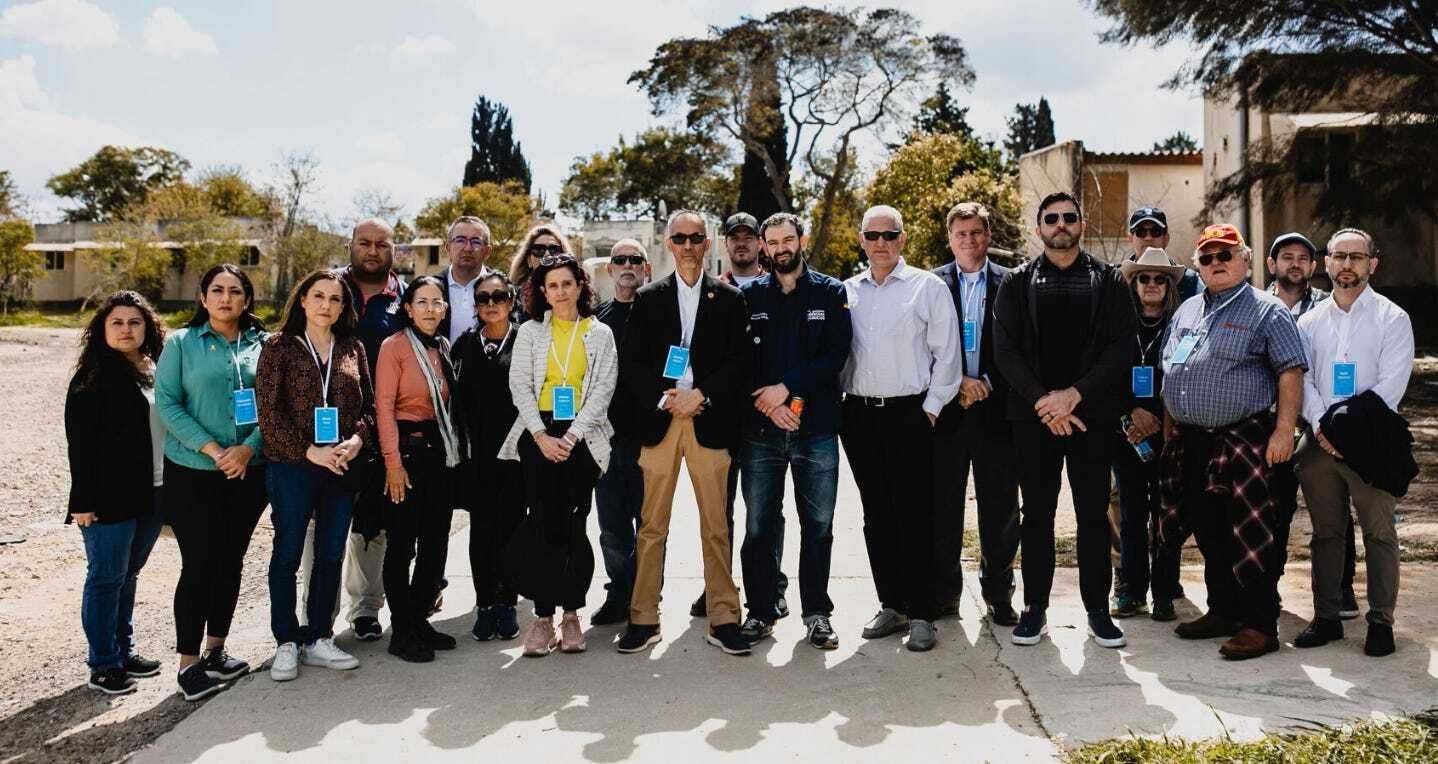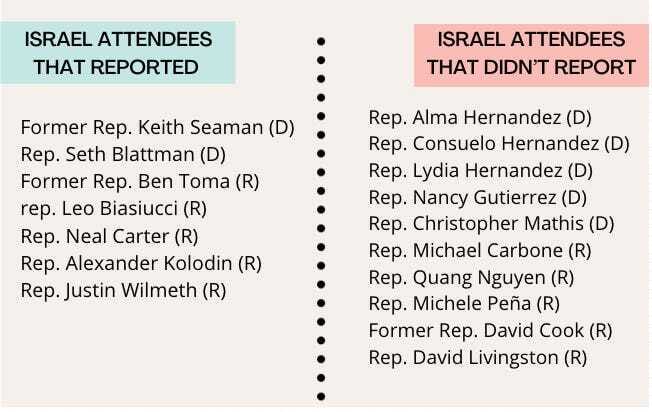Midway through last year’s legislative session, 17 lawmakers abandoned their duties of solving a budget deficit to take a week-long trip to Israel.
It was a once-in-a-lifetime experience. But apparently most of the attendees already forgot about it.
Lawmakers are legally required to report trips they take that are reimbursed or paid for by other people, lobbying groups or foreign governments. Every person who served in public office last year had to report their financial information by Jan. 31 this year.
But we only know about the Israel trip because we broke the story.
Twelve out of the 17 state legislators who went to Israel — a trip the New York-based nonprofit itrek paid for — didn’t bother to report the excursion.

Democrat Rep. Alma Hernandez, a staunch Israel supporter who organized the trip, posted several pictures from Israel online. Yet, the only trip she reported last year was a conference in Denver.
That memorable trip to Israel that garnered headlines across the state?
“I completely forgot to include it. No other reason other than I forgot to as I was submitting it right before the deadline,” she told us.
There’s a lot of that going around.

There’s a reason public figures have to disclose their financial interests: They can reveal conflicts of interest within the bidding they do at taxpayers’ expense. But whether it’s because of forgetfulness or purposeful omission, there's still a lot we don’t know about lawmakers’ finances.
There’s no way to prove someone didn’t report something unless we already know about it — like the Israel debacle. And the actual monetary amounts they report for gifts, investments and business interests are reported in vague increments like $1,000 to $25,000.

But that doesn’t deter us from the annual exercise of poring through the statements to see what we can find out.
Here are the highlights…

What do these people really do for a living?
One of the most helpful things you can find from the state’s financial disclosure forms is what your lawmakers actually do for a living.
Arizona has a “citizen legislature,” meaning it’s a part-time gig and lawmakers don’t actually earn enough to make laws full-time.1
On the one hand, it’s kind of neat that ranchers, teachers, lawyers and doctors all serve at the state Capitol. On the other hand, it creates a ton of conflicts of interest.2
Knowing what your lawmaker actually does for a living can tell you a lot about their approach to lawmaking. It informs the type of bills they introduce, the committees they serve on and the votes they take.

Lawyers
Interpreting laws and writing them aren’t that different. So it’s no surprise that many lawyers become lawmakers — and some lawmakers become lawyers.
Seven lawmakers reported having their license to practice law in their financial disclosure forms. Most of them were lawyers who ran on their credentials arguing and interpreting the law — like Republican Reps. Alexander Kolodin, Neal Carter, Michael Way, Democratic Sen. Priya Sundareshan, and Democratic Reps. Brian Garcia and Chris Mathis.
But Arizona Senate President Warren Petersen has been making laws far longer than he’s been licensed to argue about them in court. Petersen, who was first elected in 2012, worked his way through law school while writing laws on the side, and passed the bar in 2023.
He’s running for Arizona attorney general in 2026.
Realtors
Real estate is the single most over-represented industry at the Capitol.
A dozen lawmakers report having their real estate license. That means about one out of every eight lawmakers makes money off the real estate industry.
Real estate is also an obvious fit for lawmakers — it can be a flexible, low-barrier, high-paying gig that essentially depends on your connections.
Lawmakers who report holding real estate licenses include Republican Sens. Jake Hoffman, Warren Petersen, David Gowan, Republican Reps. Joseph Chaplik, Alexander Kolodin, Justin Olson, Laurin Hendrix, Gail Griffin, Michael Carbone, John Gillette, and Democratic Reps. Aaron Marquez and Kevin Volk.
Consultants
Ahh, consultants — that vague job description that says nothing and usually means “lobbyist adjacent.” They’re often one-person businesses set up by lawmakers to cash in on their position and influence in government.
The Legislature has quite a few of them.
House Speaker Steve Montenegro owns Coronam Consulting.
Republican Rep. Tony Rivero owns Global Connect Group.
Democratic Rep. Analise Ortiz owns Ortiz Communications, a communications consulting firm.
Republican Rep. Justin Wilmeth owns Firebrand Strategic Consulting.
Republican Rep. Matt Gress owns Strategies Plus AZ.
Republican Rep. Justin Olson works as a consultant for the Arizona Free Enterprise Club, which heavily lobbies the Legislature.
Democratic Rep. Alma Hernandez and her sister Rep. Consuelo Hernandez (and their brother, former lawmaker Daniel Hernandez) own the Hernandi Group, a consulting firm that engages in “grasstops” lobbying, or political influencer-style campaigns and communications.
And the rest
A handful of lawmakers are certified teachers and a few more work at universities and community colleges. A few hold healthcare licenses, including a couple of registered nurses and an EMT.
We spotted one Certified Public Accountant — Democratic Rep. Rosanna Gabaldón — one liquor license holder, Republican Rep. Jeff Weninger, and a licensed massage therapist, Democratic Rep. Patty Contreras.
Who are the land barons at the Capitol?
Republican Rep. Joseph Chaplik owns 10 homes, the largest number disclosed by any lawmaker.
Republican Sen. Janae Shamp owns 45 acres in Wickenburg and another 70 acres in Casa Grande.
But the largest single spread of land that a lawmaker owns is probably Republican Rep. Leo Biasiucci,3 who owns 169 acres in Topock, which is in Mohave County near the California border.
Who has the fattest investment portfolio?
For people who only earn a $24,000 base salary, many of your lawmakers are doing just fine.
We have no way to know how much they’re actually worth individually — the financial disclosure forms only ask if an investment or portfolio is worth $100,000 or more. Some of our lawmakers could be billionaires for all we know.
But we can tell that several lawmakers have multiple investment portfolios, each worth more than $100,000.
As far as we can tell from the financial disclosure forms, Republican Rep. Joseph Chaplik holds at least $1 million worth of real estate.
Republican Sen. Jake Hoffman and Democratic Rep. Lauren Kuby also have quite a bit socked away for a rainy day — each has seven business, stock portfolio or other retirement accounts with $100,000+ in them (including their spouses).
Do any of them really like bonds?
A handful of lawmakers own bonds worth less than $25,000, but one lawmaker is heavily invested in the bond market.
As we previously noted, Republican Sen. Vince Leach invested in church bonds in Wisconsin and when he moved to Arizona to retire, he helped to legalize church bonds here, kicking off his political career.
His disclosure form shows he’s holding at least $100,000 in bonds.
They must have a lot of debts, right?
Only about a half-dozen lawmakers list their student loan debt — and a smaller number list other debts, including for their cars.
How many junkets did they take this year?
Every elected official has to disclose travel-related expenses above $1,000 that someone else paid for on their behalf.
House Republicans reported the most trips on other people’s dime last year at 42 total.
Rep. Justin Wilmeth drove up that total, however, by taking 15 trips to places like Taiwan and Portland, Oregon.

House Democrats reported 33 trips, Senate Republicans reported 32 trips and Senate Democrats reported 25. That’s 132 trips lawmakers took last year.
We know the total is higher from the 12 lawmakers who failed to report trips to Israel despite the documentation of it on social media.
But from what legislators are willing to disclose, there are some other popular destinations.
20 Republicans went to an American Legislative Exchange Council conference. That group calls itself a “nonpartisan” group “dedicated to the principles of limited government, free markets and federalism.” The New York Times previously called the group a “stealth business” lobbying firm disguised as a nonprofit.
12 Democrats went to the State Innovation Exchange in Atlanta, Georgia, for a national conference in December to network and learn how to disrupt “systems of oppression.”
Four lawmakers reported trips to a League of Arizona Cities and Towns conference in Phoenix, so we’re not sure what “travel expenses” they were reimbursed for.
Who’s the crypto king of the Capitol?
We wish we could tell you.
Unfortunately, unlike members of Congress, Arizona lawmakers don’t have to show us their crypto wallets.
But we have a feeling quite a few of them are holding some Bitcoin and Trumpcoin.

